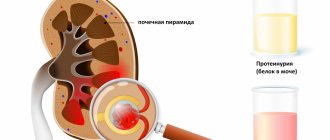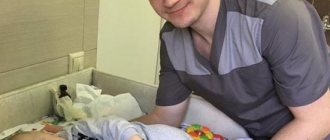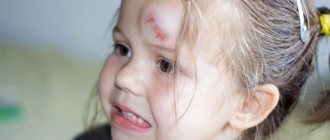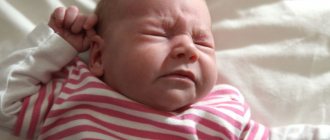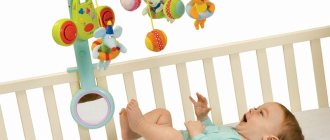Message Lethar » Thu Jun 21, 2007 08:55
Our baby turned 2 months old on June 15th. In general, everything is fine - we eat, we sleep, we grow. But something new and alarming has appeared - for three nights in a row (since Monday), around 4 o’clock in the middle of the night, the baby’s sleep becomes restless. Kicks his legs and knocks them on the bed (lifts them and drops them, as if “the abs are pumping”). At the same time, he very actively turns his head left and right. However, he does not wake up at all, but continues to sleep soundly. This continues for about 15-20 minutes. While he sleeps and turns his head, he does not take the breast. Because At night we eat regularly every 2-3 hours, I suggest the child eats after he calms down. Then we sleep until the morning, feeding periodically.
Sometimes he shakes his head the same way during the day when he’s just lying in bed. but I regarded it as curiosity or “examination.”
True, there is another factor mixed in here that since Sunday the heat has been 28-30 degrees. And in general, it doesn’t drop much at night either – down to 20 degrees. However, all other processes are not disrupted.
So, does this child’s condition require an urgent consultation with a neurologist, or should we wait until 3 months (we are scheduled to have a consultation with a neurologist)? Is there anything else I need to pay attention to?
New parents always carefully monitor their newborn baby. This is why the question often arises: why do babies shake their heads from side to side? This condition occurs both for harmless reasons and appears as a result of serious pathological disorders.
Causes of head shaking
There are many completely harmless reasons why a newborn may shake his head while feeding. Quite often, the baby enjoys breastfeeding. According to research, it has been proven that if the balance center of the patient's brain is overstimulated, then the child gets pleasure from shaking his head. In some cases, when performing this action, the child laughs. This is normal, so parents should not worry.
If a newborn has headaches, the child begins to shake his head to eliminate them. At the same time, the child becomes overly capricious. Only a competent doctor can tell you why the baby shakes his head.
The reasons for this condition may be as follows:
- colic in the abdomen;
- teething;
- otitis.
By shaking the head in these pathological conditions, the baby tries to distract himself from the pain. Physiology can tell you why the baby shakes its head. After birth, the newborn experiences strengthening of the neck muscles for several months.
Sometimes head shaking is observed during eating. That is why it is necessary to feed the baby so that its head is fixed in the mother’s hands. After the baby begins to hold his head confidently, mothers should not hold it during feeding.
If a child frequently shakes his head, especially before going to bed, this may indicate the development of rickets. During this period, the baby experiences general weakness and twisted limbs. The child cannot hold his head up until 4 months. When this pathology appears, the baby’s sleep is disturbed and the child becomes whiny.
Quite often, a symptom of pathology is loss of appetite. If signs of this disease appear, the baby should be seen immediately by a doctor. Only a specialist can correctly diagnose and prescribe rational treatment. Otherwise, it is possible to develop flat feet, scoliosis, and protrusion of the chest forward.
Occasionally, infants experience this condition due to curiosity. Infants may experience this phenomenon if the back of the head sweats. The reason for this is improper temperature control in the room and excessive wrapping of the baby. When disturbing dreams appear, the baby may experience head shaking.
There are many reasons for the development of pathology. Some of them may be completely harmless or indicate the development of serious illnesses.
Neurological diseases
Quite often, a child shakes his head in his sleep due to neurological diseases. In most cases, this phenomenon appears against the background of:
- hydrocephalus;
- epilepsy;
- autism.
In the evening, head shaking can occur after a strong emotional outburst. During the head shaking period, the child screams or cries, and after the attack ends, he exhales. After this, breathing may stop for a certain time.
This phenomenon can be observed with reflex tetraparesis, which is accompanied by tilting the head to one side. Since the child has muscle hypertonicity and pathological reflexes, the child cannot hold his head level for a long time. Because of this, the child begins to shake his head even in a lying position.
If the symptom is observed when falling asleep, then this indicates the development of Krabbe disease. In this case, the child experiences poor weight gain, seizures and allergic reactions to milk. Quite often the disease is accompanied by vomiting and hyperpyrexia. The newborn becomes excessively whiny.
Opticomyelitis is often accompanied by this symptom. During the period of falling asleep, the child experiences dizziness as this pathological process develops. Damage to the distal parts of the hands and feet may occur. The disease is accompanied by optic neuritis. The newborn has frequent headaches, so the head shakes. In some cases, the performance of the pelvic organs is impaired.
If a child suffers from epilepsy, then during the period of falling asleep the limbs may twitch and the head may periodically shake . During sleep, these signs may intensify, causing the baby to start crying. But the baby quickly calms down on his own. The frequency of attacks and the intensity of headaches are directly affected by the severity of the disease.
The causes of the symptom are not only varied, but also quite dangerous. Therefore, parents should closely monitor the behavior of the newborn.
Recourse
If the child has no other symptoms when shaking his head, then parents have no reason to worry. In some cases, the cause of pathology is a surge of emotions that occurs against the background of stressful situations. In this case, you need to try to calm the baby. If the actions of the parents do not bring the desired result, then you need to seek help from a doctor.
During the period of involuntary head shaking, head injury may occur. Parents need to take this fact into account and prevent it. If the newborn shakes his head and other symptoms are observed, then the child must be shown to the pediatrician. Only a specialist can correctly diagnose a baby and, if necessary, prescribe rational treatment.
A newborn baby's head shaking can have completely harmless causes. If this occurs infrequently and is characterized by the absence of other symptoms, then parents should not worry. Otherwise, the child needs to be shown to a specialist who, after examination, will be able to determine the pathology.
Studies have shown that this behavior is observed in 20% of infants. In most cases, this is caused by the fact that the baby distracts himself (on an intuitive level) from any sensations that cause him discomfort. This could be minor pain in the ears or the process of teething. This should not cause any particular concern for parents. Just at a routine appointment, you can tell the pediatrician about this strange behavior to reassure yourself.
Most often, cases of head shaking are observed in babies starting from the age of six months. Parents just need to worry about the safety of the child, eliminating any possibility of injury (remove all protrusions on the crib or playpen, cover the fastenings and sides with soft fabric). A cause for concern and an urgent visit to a doctor is if this head shaking is accompanied by other symptoms, in particular:
- restless sleep
- rolling out hair at the back of the head,
- profuse sweating during feeding and sleep.
These signs may indicate manifestations of rickets in the initial stage, caused by a lack of vitamin D in the body. The pediatrician will prescribe treatment, recommend undergoing an examination and consulting a pediatric neurologist.
Alarming symptoms
Why a baby cannot fart - what to do
If head movements during sleep are very strong, such that there is a risk of injury to the baby, or they do not disappear after five years, it is advisable to consult a pediatrician.
In addition to head shaking, symptoms indicating a lack of vitamin D and the possible development of rickets include:
- excessive sweating on the back of the head while the baby is feeding or sleeping;
- delayed teething;
- flattening of the skull bones in the occipital area;
- fontanelles do not heal for a long time;
- the hair on the back of the head disappears;
Bald back of the head with rickets
- irritability and restlessness during sleep;
- loss of appetite;
- muscle weakness.
Important! Only a doctor can make a diagnosis and prescribe vitamin D in the correct doses.
Early manifestations of autism can be recognized by the following signs:
- the baby does not smile when he sees his parents or relatives;
- the child expresses little emotion;
- the baby does not seek eye contact;
- The baby may not like being hugged.
Neurological diseases or the development of rickets are never determined solely by the presence of head shaking in sleep. They have accompanying signs that can be analyzed by a specialist. If the baby simply turns his head without other symptoms, most likely, concern about his health is in vain, but it is necessary to calm the child or eliminate the influence of irritating factors.
Why does a newborn shake his head in his sleep?
Usually, the fact that a baby shakes its head from time to time while awake or turns it from side to side during sleep is considered a normal physiological feature of five to seven month old children. In this way, the baby gets rid of the sensations that create discomfort and relaxes. This should not be prevented, so as not to increase nervous tension.
If the restlessness and intensity of head shaking increases greatly while the child is sleeping, you just need to pick him up, stroke his head and lull him to sleep.
If, upon reaching the age of 8 months, the frequency of periods of such shaking increases, and at the same time the baby also jerks his head convulsively, this may indicate:
- headaches,
- lack of vitamin D,
- increased pressure inside the skull.
Such a baby should be shown to a specialist as soon as possible, whose competence is to confirm or exclude any serious disease and prescribe (if necessary) adequate treatment.
Hello! Our baby is 3 months old, until recently everything was fine with sleep - we woke up 1, maximum 2 times during the night to eat (BW). She started tossing and turning in her sleep (this happened at about the same time) - shaking her head a little and twitching her legs, I understood that she would wake up soon, I fed her and she fell asleep peacefully until the morning. The baby sleeps separately. But in the last couple of weeks, these “tossing and turning” have become more frequent - 1.5 hours after she has eaten and fallen asleep, she just begins to have a little agony - she tosses and turns for a minute, then sleeps peacefully, then tosses and turns again, and so on until she wakes up from all this. As a result, so that she (and we) can sleep normally, I feed her and she immediately falls asleep. We don’t swaddle, we don’t rock, there are no problems with falling asleep. But due to such restless sleep, our awakenings and meals at night have become 1-2 times more frequent and occur every 2-maximum 3 hours. During the day he sleeps peacefully, not much - in total, he sleeps 14-15 hours a day, that is, no more than he should. The pediatrician says her need for food has increased and she just wants to eat more often, this makes her toss and turn and wake up, but I don’t really believe it, because the older the child, the easier it should be for him at night without food, and if she used to endure almost the whole night , then now there shouldn’t be any problems with this. I saw a neurologist at 1 month, everything was fine, he said not to show up until 6 months if there were no complaints. Other than that, there are no complaints, everything is great, is it worth visiting? It’s hard to get to a neurologist here, but we’ll go for a fee if necessary. Well, in general, I’m wondering what could cause such a dream? The tummy seems to have gone away, drooling is flowing, but it seems to be too early for the teeth and they are not yet visible. I know 10 rules of sleep, we observe everything except the ideal temperature and humidity ((We live in the north and because of the frosts the radiators are very hot, there are no regulators on them and there is no technical ability to install them, all the radiators are covered. We open the windows, ventilate constantly, the temperature is at On average, it stays at 23-24 degrees. With open windows, the humidity drops and above 40, even with the help of constant wet cleaning and a working humidifier, it is not possible to raise it. In general, a vicious circle - if the window is closed, the humidity is normal, but it becomes hot, and the window is open - it becomes It's cool, but the humidity is falling. Therefore, we try to keep it in the middle, as I wrote above - temperature 23-24, humidity 35-40. Could this be the cause of poor sleep? If so, why didn't it bother me before, because everything was the same? Well and what to do in this situation, besides changing the place of residence, how to organize a restful sleep for the baby and my husband and I under such conditions?
All parents are pleased to look into the crib of their son or daughter and see how soundly and sweetly their baby sleeps. This process always causes emotion in every person. However, it also happens that the baby has a rather restless sleep: he often wakes up; may sob or cry when sleeping; shudder; turn your head in your sleep. All these symptoms make any mother anxious. But often these symptoms can be the result of some disorder or disease.
The main reasons for poor sleep in a child can be:
- excess of emotions;
- physiological characteristics of each baby;
- neurological disorders;
- somatic problems.
These violations can occur due to various factors. They can be overexcitement or fatigue, which occurs after active games before bedtime. It could also be caused by too much sleep. Perhaps the baby has some health problems. Or he'll have nightmares.
At the same time, many parents are concerned about the problem of why does the child turn his head in his sleep?
20% of babies turn their heads before the first year of life. Moreover, this problem occurs much more often in boys than in girls. However, between five and seven months of age it is considered normal. It happens that head shaking becomes a habit in children and it can persist for several years. But most kids outgrow it by about three years.
A child turns his head in his sleep - reasons and when to see a doctor
Every parent, of course, worries about the health of their child. The timely development of the child, his capabilities, as well as the future depend on the state of health. Any attentive parent always notices all the little things in their child’s behavior, even during sleep.
Sleep can be called an unconscious state, because a person does not control his movements, and that is why the baby’s behavior during sleep can tell the parent a lot. Many young mothers are worried that the child turns his head from side to side in his sleep, they begin to worry and wonder: is this normal? You began to notice that your child sleeps restlessly. He turns his head quite often in his sleep without waking up. What could this be and should I be worried?
But the reasons when a child turns his head in a dream can be different:
- One of these banal methods can be ordinary relaxation. The child can simply relieve tension by rhythmically shaking his head in different directions, both while awake and when sleeping.
- A child turns his head in his sleep when something hurts. This could be the process of teething, pain in the gastrointestinal tract, pain in the ears, and the toddler may just have a headache. And when he starts to turn his head, the pain slowly subsides.
- Another reason may be a lack of such important vitamin D in the baby’s body. As a result, the child may develop rickets, that is, a disorder of phosphorus-calcium metabolism. To prevent this from happening, you need to take your baby for walks in the fresh air more often and take Nycomed Calcium-D3.
- It may also be an increase in muscle tone or intracranial pressure.
- If a child is upset, lacks parental attention, or is developmentally delayed, this can also be the reason why the child turns his head in his sleep.
However, you should not make hasty conclusions. In most cases, the problem if a child turns his head in his sleep is not as bad as many parents think. And in most cases you don't even have to worry about it. But at your next visit to the doctor, it’s better to tell him about it.
- Messages: 2
- Registered: Sun Oct 15, 2006 22:13
- From: Moscow
- Profile
- Top
- Report this message
Super VIP
- Messages: 2764
- Registered: Tue Oct 11, 2005 15:30
- From: Germany
- Profile
- Top
- Report this message
Old timer
- Messages: 640
- Registered: Tue Apr 18, 2006 23:03
- From: Moscow
- Profile
- Top
- Report this message
- Messages: 2
- Registered: Sun Oct 15, 2006 22:13
- From: Moscow
- Profile
- Top
- Report this message
Guru
- Messages: 7762
- Registered: Tue Jul 20, 2004 10:31
- From: St. Petersburg
- Profile
- Top
- Report this message
GOD
- Messages: 10619
- Registered: Thu Apr 08, 2004 04:17
- From: LV/PA
- Profile
- Top
- Report this message
Kitiket - when at 4-5-6 months the baby begins to twist his head a lot, and even sweats especially during feeding, then this may well be signs of rickets. and here you need to see a doctor as soon as possible.
Guru
- Messages: 7762
- Registered: Tue Jul 20, 2004 10:31
- From: St. Petersburg
- Profile
- Top
- Report this message
GOD
- Messages: 10619
- Registered: Thu Apr 08, 2004 04:17
- From: LV/PA
- Profile
- Top
- Report this message
VIP
- Messages: 1655
- Registered: Wed Nov 02, 2005 20:14
- From: Jerusalem
- Profile
- Top
- Report this message
VIP
- Messages: 1520
- Registered: Fri Oct 13, 2006 00:02
- Profile
- Top
- Report this message
Guru
- Messages: 7762
- Registered: Tue Jul 20, 2004 10:31
- From: St. Petersburg
- Profile
- Top
- Report this message
Old timer
- Messages: 699
- Registered: Wed Dec 14, 2005 19:30
- Where: out of sight from here!
- Profile
- Top
- Report this message
Guru
- Messages: 7762
- Registered: Tue Jul 20, 2004 10:31
- From: St. Petersburg
- Profile
- Top
- Report this message
Old timer
- Messages: 699
- Registered: Wed Dec 14, 2005 19:30
- Where: out of sight from here!
- Profile
- Top
- Report this message
Guru
- Messages: 7762
- Registered: Tue Jul 20, 2004 10:31
- From: St. Petersburg
- Profile
If, in addition to a receding hairline and shaking the head from side to side when falling asleep, there is sweating of the head during feeding, rapid fatigue, then all the signs of early rickets are present on the face. In order to somehow motivate your pediatrician, I advise you to take a urine test according to Sulkovich, which will show whether you have rickets or not, and whether you need to increase vitamin D and by how much.
We shake our heads in our sleep, as a result of which we wake up, we don’t have head sweating, our palms and feet sweat a little from birth. But I will still pass the analysis. Thank you
I completely forgot about sweating hands and feet - this is also a sign of early rickets. Yes, you can read all this yourself on the net. There is a lot of information. My child had all the signs. I increased the dose of vitamin D to 5 drops and gave it for 2 months, then I started giving vitamin Multitabs Baby for 2 months and then 2 drops of Vigantol. Unfortunately, vitamin Aquamaris is being re-registered and will appear sometime in May. Aquamaris is a watery preparation and is better absorbed. And Multitabs Baby contains vitamin A, which ensures that there is no overdose of vitamin D. And the children of all my friends had receding hairlines, some of them are already overgrown, some still have receding hairlines, and tests show that there are no deviations. Therefore, before increasing the dose, be sure to get tested and consult with your doctor. Good luck! Everything will be fine for you!
Head shaking during sleep as one of the symptoms of diseases
If a child has other pronounced symptoms in addition to shaking his head in a dream, then this is a reason to visit a doctor. An absolute determination of the cause of a child shaking his head in his sleep, and, as many years of practice have shown, this may indicate the presence of certain diseases. These include:
- Hydrocephalus cerebral (in children) is a disease that affects the tissues near the brain. It consists of excess cerebrospinal fluid in the head. Hydrocephalus most likely appears for the first time during 3-5 months of a child’s life. The causes may be: fetal hypoxia, birth injuries, congenital anomalies, infection with infectious diseases in the womb. Hydrocephalus can also be a consequence of the following diseases: mumps, syphilis, ARVI, herpes, toxoplasmosis and others. Symptoms of hydrocephalus: large skull size, swollen fontanel, cramps, poor sleep and appetite, vomiting, drowsiness and irritability, difficulty speaking and developing, inability to hold up head and sit up. For an accurate diagnosis, you need to contact a pediatrician; if you suspect this disease, visit a pediatric surgeon or neurologist. This disease has the potential for death and complications, so it is very important to detect it in time and begin immediate treatment.
- Early rickets is a disease caused by a lack of vitamin D in the child’s body. In this case, the exchange of phosphorus and calcium is disrupted, as a result of which bone tissue damage begins. This disease has specific signs: sleep disturbance, irritability and tearfulness, frequent shuddering, lack of appetite, swollen fontanel, baldness of the occipital area. In an advanced stage, rickets manifests itself in compactions on the ribs and wrists, curvature of the spine, chest, and the child may develop flat feet and develop an abnormal bite. Rickets is very important to diagnose and treat in a timely manner, since this disease can lead to disruption of the child’s development (both mental and physiological), improper development of the cardiovascular system, liver, lungs, and gastrointestinal tract. Typically, a pediatrician detects rickets during an examination of the baby, but sometimes a biochemical blood test may be necessary.
- Increased intracranial pressure (ICP). This can be ruled out by a pediatrician during a routine examination. With increased intracranial pressure, the child may have a headache, which is why the newborn child may shake his head in his sleep.
Child hits his head 07/20/2015 23:43
A child hitting his head on a crib or other surface is a behavior that frightens adults. Head banging often occurs before going to bed or during night awakenings.
Is this normal? Head banging can be either a completely normal age-related behavior or a symptom of certain problems. Let's discuss below.
MEDICAL PROBLEMS
Some health problems can cause head banging.
For example, a child may hit his head due to increased intracranial pressure due to headaches. Head banging is sometimes associated with the behavior of children suffering from various neurological disorders.
If the child begins to beat or shake his head for the first time, the cause may be a simple pain in the ears.
Therefore, first of all, be sure to discuss the problem with a pediatrician and neurologist.
In addition, analyze the situation as a whole:
- When did head banging appear? Did this coincide with any events, procedures, or medications taken?
- What time of day does head banging occur?
- What else worries you about your child’s development?
Children with certain diagnoses.
In children who are blind or deaf, head banging may be a way of compensating for lack of stimulation during the day.
Association with autism.
Head banging may be associated with autism spectrum disorders. If a child develops head banging, it is necessary to analyze the presence of other markers that help distinguish normal head banging from that associated with autism.
These behavioral markers are called:
- absence of pointing gesture by 14 months of age
- not following an adult's gaze when looking at something by 14 months
- no attempts at role play by 14 months.
If there are similar red flags in your child’s behavior, you should in any case contact a neurologist.
EMOTIONAL COMPONENT
There is an opinion that children deprived of parental warmth and affection are beating their heads: for example, children in an orphanage. Indeed, quite often head banging occurs in these children. Unmet emotional needs and stress cause the child to need to self-soothe in this way.
If your baby suddenly starts rocking or banging his head, analyze what has been happening lately. If you suspect that the matter is in the emotional sphere, then the decision will depend on the situation. Sometimes it is enough just to give more time and attention to the child. Sometimes the help of a child psychologist is required. There can be no specific advice here.
NORMAL RHYTHMIC BEHAVIOR
If the child is healthy and has no specific diagnoses, but you are faced with repeated head knocking.
In most cases, this type of head banging is a normal part of a child's development. Normal, provided that:
- Your child is under four years old.
- You have ruled out potential health problems that could be causing head banging.
- Head banging occurs only when falling asleep.
- There are no other red flags in the baby’s behavior and development.
Children can use rhythmic movements to self-soothe. Many experts spoke at one time on this issue. For example, the famous American doctor Richard Ferber, who deals with the problems of children's sleep, states: “Although this behavior seems very strange, it represents an absolutely normal stage of development.”
Not all babies rock or bang their heads: only about 5% of children exhibit these behaviors. For some reason, boys hit their heads more often than girls.
If head banging begins after 4 years of age, or an existing behavior begins to sharply increase in duration and severity, then it is worth consulting with a pediatrician and neurologist.
Why does head knocking occur?
Small children love rhythmic behavior: rocking, rocking, sucking. The child probably knocks his head because he is used to preparing himself for sleep in this way. This is his habit that brings comfort. Behaviors that bother parents usually begin before the first year of life. On average, rocking appears at about 6 months, and head banging at about 9 months.
In healthy children, head banging is caused by insufficient sensory stimulation during the day, lack of contact with the mother, as well as overexcitation and excessive stimulation. In the first option, the child tries to compensate for the deficit by hitting his head, and in the second, to calm down.
Is this dangerous for the child?
The child will not harm himself: if it hurts, he will stop.
How can you help your child?
1. Usually the habit disappears within a year from its beginning. You can gently help your baby replace it with another sleep association.
2. Rate: How good is your bedtime routine? Perhaps the child simply lacks the existing ritual to create a sleepy mood? Sometimes it’s enough to introduce a sleep ritual and the head banging goes away on its own.
3. I also advise you to evaluate the adequacy of your baby's sleep: if the baby does not get enough sleep, the frequency of strange behaviors increases.
4. And, on the contrary, evaluate: are you expecting too much from your child? Sometimes, children already need less sleep than parents think. As a result, the baby cannot fall asleep for a long time and begins to put himself to sleep by rocking or hitting his head, because he knows that he cannot leave the bed. For example, a three-year-old boy sleeps 2.5-3 hours during the day, but at night his parents want him to sleep 12 hours straight. The real need for night sleep in a child, taking into account daytime sleep, is 10.5-11 hours. The child spends about an hour awake in bed. In this case, a simple experiment with a later start of nighttime sleep helps parents understand that the child needs less sleep and that his behavior was caused by a long stay in the crib.
HYSTERICS
In children of a certain age (usually one and a half years and older), head banging can occur during a tantrum.
In this case, head banging is usually a way to get the parents' attention and some form of manipulation. Often children who do not yet know how to speak in sentences resort to head banging. They express their emotions through knocking, as they are unable to express them in words. As a rule, as speech develops, the child stops resorting to head banging during tantrums.
| 16.03.2020
We will tell you why you should not shake your child, why you should not throw your child up or throw him on the bed. The fact is that all these actions can lead to serious consequences, even fatal!
Shaken baby syndrome (SBS) is also known as post-concussion syndrome, shaken baby syndrome, or shaken baby syndrome. All of these names mean the same thing: brain damage resulting from a head injury in a child.
DFS can also be found in children under 5 years of age, although the average age for the disease is 3 to 5 months. The peak occurs at 6–8 weeks of age, which is the time when babies cry the most. In babies under one year old, the head is the largest and heaviest part of the body (up to 15% of the total body weight). Compared to the large head, the neck muscles are extremely weak.
In 70% of cases, male representatives - fathers or stepfathers, often young - are to blame for child injuries. But anyone who is unable to cope with emotions and overcome anger, and who is also prone to using force, may resort to vigorous shaking of the child in order to calm him down. Also, alcohol abuse is often a cause of SDS.
When a person shakes a baby vigorously, his unfixed head flops because weak neck muscles are not yet able to properly support the head. As a result, the child’s brain is also not in a static state, the membranes of brain cells are torn, blood vessels are torn and tissues are damaged. All this can provoke hemorrhage under the membrane of the brain.
The situation can be aggravated by the action of an adult, such as throwing the child forcefully onto the bed. Swelling in the brain due to severe shaking can cause a lot of internal pressure, compressing blood vessels and further damaging the baby's fragile brain.
Habitual games with children, lightly tossing or tossing a child on the knee, do NOT lead to this injury. But under no circumstances should you SHAKE a child.
Even if after severe shaking the child looks absolutely normal outwardly, after some time one of the symptoms may still appear. Most often, the problem occurs without any outward signs of damage, and problems with behavior, memory or learning become obvious only when the child starts school.
How to prevent concussion syndromes?
Know that a child's crying is normal. Learn to calm your child down. Realize what to do with the feeling of your own powerlessness and anxiety in moments of incessant crying of the baby. Remember that shaking can be fatal to a baby.
How to calm your baby?
- Method Sh-P- S-P-K
Sh-noise: white noise or other noise similar to what the baby heard while in the womb. A vacuum cleaner, hair dryer, dryer, tap water or a special device for creating white noise will help you.
L-position lying or on the side: (position on the left side - to help the child digest food, on the stomach - while the parent is holding the child)
C-pacifier: breastfeeding, bottle, nipple or finger.
P- swaddling : a baby wrapped in a blanket like a “burrito” will help him feel safe. You can use loose swaddling.
K-rocking: Gently rocking in a chair, crib, or car ride can help your baby feel similar vibrations to what they experienced in their belly.
If the baby continues to cry:
- If your baby continues to cry, try the following:
- make sure your baby is fed and does not need to change his diaper;
- check whether the child is sick;
- rock or carry the baby in your arms;
- talk or sing to your child;
- give your child a pacifier or toy;
- ride your child in a stroller or in a safe child seat in the car;
- hold the child close to you and breathe slowly and calmly;
- buy in a warm bath;
- stroke the baby's back;
- ask someone to help you take a break and look after the child;
- if there is no result, put the child in the crib, close the door to the room and observe his behavior for 10 minutes.
- Call your doctor if your baby doesn't stop crying, as there may be a medical reason.
To prevent SDS, parents and caregivers need to learn to manage their stress.
It is important that anyone looking after children knows not to shake them under any circumstances and the dangers and consequences of childhood injuries!!!
Much attention is paid to the topic of preventing childhood injuries in classes to prepare expectant mothers for childbirth and motherhood. I would like to strongly recommend attending such classes to make your parenting more correct and conscious, and your children’s childhood safe.
You can get even more useful information from your local obstetrician-gynecologist, psychologist or psychotherapist, as well as when attending classes at the School of Expectant Mothers. To clarify the working hours of specialists and the schedule of classes, questions about pre-registration, please call 8-0152-31-64-30, 8-0152-31-64-33, or on the website https://gp7.by/.
The article was prepared by the psychotherapist of the residential complex of the State Healthcare Institution “City Clinic No. 7 of Grodno” Kruk A.N.
March 20 – World Oral Health Day
What you need to know about coronavirus
A child shakes his head from side to side - is it a game or an illness?
Already at the age of 1 month, children can turn their head while lying on their side. The stronger the muscles and bones become, the more movements the baby masters. He cranes his neck as he crawls, shakes his chin with excitement, and even nods, imitating the word “yes.” And suddenly, at the age of 5-6 months, the baby begins to turn his head.
The rotational movement is repeated many times. Some children spin and sway their whole body for 15 minutes at a time. Parents are frightened by strange behavior, but it is quite natural.
Here are 7 reasons why a child shakes his head:
- masters new motor skills;
- attracts attention;
- tired and wants to sleep;
- happy or excited;
- feels itchy from teething;
- explores one’s own feelings;
- bored.
After observing your baby, you will quickly understand what reason causes him to spin. Meet him halfway - put him to bed, give him a teething ring, or just cuddle him.
It has been noticed that boys like to twist their heads and even hit them against the crib or wall more often than girls. Boys aged 6-7 months especially like such fun.
Let's draw conclusions
According to medical statistics, one out of five babies aged 2-3 months shakes their head when falling asleep or while sleeping. As a rule, this has a causal relationship with outbursts of emotions, overexcitation of the central nervous system, otitis media or pain from teething.
INTERESTING: what time do newborns start cutting their first teeth?
If this phenomenon is systemic (the head constantly shakes and the baby cries loudly after falling asleep), relaxation therapy may be necessary. It may be enough to reconsider adults’ approaches to bedtime rituals and daily routines.
As already mentioned, very rarely rocking is a symptom of a minor developmental delay or the onset of rickets. If this worries you, do not delay your visit to a neurologist and pediatrician.
Should you go to the doctor if your child shakes his head?
There are times when rotational movements should be a concern. Parents should consult a pediatrician if their baby:
- sways more with excitement;
- does not communicate with family members;
- does not respond to the voices of relatives, music, barking dogs, etc.;
- noticeably lags behind in speech and mental development;
- injures himself while moving.
These symptoms may indicate autism, a disorder of brain development. A medical examination is especially important for a child who has been exhibiting unusual behavior for more than 2 years.
Sometimes head shaking combined with loud crying, poor sleep and restlessness are signs of an ear infection or severe teething pain. The pediatrician will identify the disease during an examination.
When a child shakes his head, you need to take a closer look at his other habits and characteristics. Does he eat normally, smile, react to the world around him? So everything is fine! He just wants you to play with him!
- Why does the baby turn his head negatively?
- Why can a baby scratch his head?
- Why do babies' chins twitch?
Possible reasons
Most babies begin to shake their heads around 5-7 months (an older age is possible), and many different factors can contribute to this. Of course, a baby can turn his head negatively during play, simply enjoying his new skill, but most often this indicates some problems with the baby’s health. For example, the reasons for this behavior may be: - increased intracranial pressure; - headaches, otitis media, teething; - problems in the tummy; - rickets.
Pay attention to the general condition of the child, watch him, maybe he has other characteristic symptoms. If a baby turns its head against the background of rickets, then it can be identified by the accompanying symptoms. Sweating throughout the body, and especially the head, increases; hairs wear off and fall out. This can cause great discomfort for the baby, so he turns his head in an attempt to scratch the back of his head. To prevent this disease, pediatricians strongly advise all children to take additional vitamin D in the spring, autumn and winter.
If your child suffers from tummy problems, then he turns red, spins, draws in his legs, has difficulty going to the toilet and turns his head in a negative manner in helplessness.
Perhaps your baby has chosen head shaking as a way to distract himself from some unpleasant stimuli, such as teething or ear pain.
If you have undergone a full medical examination, and the doctor has not detected any of the above diseases, then there is no need to worry, because head shaking is not always an alarming factor, maybe he just likes to perform new movements and have fun in this way. Some babies even rock themselves to sleep this way. Or maybe the baby, by doing this, is simply copying your body movements.
Features of head shaking associated with age
Fever, rash and cough in a child - what is it?
For reasons that do not cause concern, the baby turns its head in its sleep, starting at about 2 months. In the fourth year of life this gradually stops.
Important! At certain age stages, head shaking can occur due to various factors. Some of them disappear, others appear.
For example, a newborn is about to start teething, and she begins to shake her head in her sleep because of pain in her gums. After the teeth come out, the factor that provokes these movements will disappear. Children aged 6-8 months are actively exploring the world and are overwhelmed with emotions, therefore, when falling asleep, they can shake their heads amid excitement from the day's impressions.
At 3 months
When a baby turns his head in his sleep, 3 months is the age when the first attempts to calm down and relax may appear. It is also possible that these are early signs of vitamin D deficiency.
At 4 months
Four-month-old babies begin to cut their teeth. If the child has never shook his head in his sleep before and suddenly begins to do this, while he salivates profusely, the baby whines and sleeps poorly, then it is quite possible that the change in behavior is associated with teething.
How to behave as parents
If a disease has been discovered, then, naturally, you need to promptly begin to treat it. If not, then you shouldn’t pay much attention to it.
Shaking your head during sleep can lead to injury, so you should worry about the safety of the child, equip the crib with soft sides and check the fastenings.
Scary dreams can provoke unconscious shaking of the head during sleep; at these moments it would be nice to gently stroke the baby on the head or back, your warm touch will calm the baby.
- 1
- 2
- 3
- 4
- 5
Fairy tale therapy for children author Daniella Svatikov
Psychology
